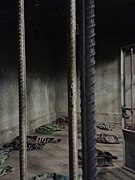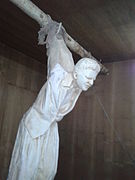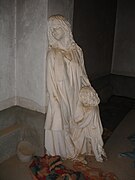Amna Suraka

Amna Suraka (
Prison
From 1979 to 1991, during Saddam Hussein's rule in Iraq, Amna Suraka was the northern headquarters of the Da'irat al-Amn/Directorate of General Security, the Iraqi Interior Ministry's intelligence agency, colloquially referred to as just Amn.[2] Many people were imprisoned there, especially students, Kurdish nationalists, and other dissidents. Many were tortured and raped. During the 1991 Battle of Sulaymaniah Iraqi security officials and soldiers retreated to the Amn headquarters which served as the Baathist stronghold in the city and held off rebels for nearly two days until the prison was captured by Peshmerga forces, following a 2 hour long assault. Rebels summarily executed 300 Amn agents, with angry civilians killing many others. One group of mothers whose sons had been killed at the compound stoned and axed to death 21 Iraqis. In total, between 700 and 800 secret policemen and soldiers were killed, although many conscripts were pardoned and allowed to return to their homes in the south by KDP chief Massoud Barzani.[3] The building has many bullet marks from that battle.[4]
Museum
In 2003,
At the museum, the history of human rights abuses is used in a narrative of Kurdish nationalism.[6] According to Autumn Cockrell-Abdullah, the museum attempts to "constitute the Kurds as a nation and nation-state and to demarcate the boundaries of a Kurdish national identity" by memorializing human rights abuses against Kurds.[5][1]
In 2013, Vice News reporter Orlando Crowcroft called Amna Suraka "the world's most depressing museum", as well as the biggest tourist attraction in Sulaimaniyya.[4]
References
- ^ .
- ^ "ENDLESS TORMENT: The 1991 Uprising in Iraq And Its Aftermath". Human Rights Watch.
- ^ "ENDLESS TORMENT: The 1991 Uprising in Iraq And Its Aftermath". Human Rights Watch.
- ^ a b c Crowcroft, Orlando (31 October 2013). "The World's Most Depressing Museum Is in Iraq, of Course". www.vice.com. Retrieved 16 May 2021.
- ^ ISBN 978-0-19-008747-0.
- ^ "The Museum of Amna Suraka: a Critical Case Study of Kurdistani Memory Culture". Leiden University. Retrieved 16 May 2021.
Further reading
- Fischer-Tahir, Andrea. 2012. “The Concept of Genocide as Part of Knowledge Production in Iraqi Kurdistan.” In Writing the Modern History of Iraq: Historiographical and Political Challenges, edited by Jordi Tejel, Peter Sluglett, and Riccardo Bocco, 227–244. Hackensack, NJ: World Scientific.






